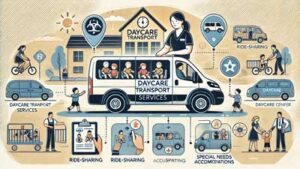Parents today face a range of challenges when juggling professional and personal responsibilities. Flexible daycare services offer a much-needed solution for those with unconventional schedules or fluctuating commitments. For instance, parents working non-traditional hours, such as healthcare professionals or gig economy workers, often struggle to find care that aligns with their needs. Flexible daycare services cater to these unique requirements by providing customizable schedules, including part-time care, drop-in options, and extended hours.
Additionally, such services offer emotional relief. Knowing that their children are in a safe and nurturing environment during unpredictable situations, such as work emergencies, gives parents peace of mind. According to a 2023 survey by the National Association for Child Care Resources, 67% of parents reported that flexible daycare options reduced their stress significantly.
For parents of multiple children, flexible daycare services simplify logistical challenges. These services often provide sibling care discounts or tailored programs for different age groups, ensuring that each child receives age-appropriate activities and attention. This level of personalization makes childcare more accessible and accommodating, enabling parents to focus on their work and other responsibilities confidently.
Flexible daycare services directly address the needs of busy parents by eliminating the rigidity of traditional childcare systems. Many families operate on schedules that change weekly, and these services adjust accordingly, offering care on short notice or specific days. This adaptability prevents parents from having to rearrange their work or personal commitments.
One major benefit is the financial savings these services can provide. For instance, instead of paying for full-time care that they may not need, parents can opt for part-time packages or hourly rates. This pay-as-you-go model is especially helpful for parents who work part-time or freelance, as it aligns with their income patterns.
Furthermore, flexible daycare services often incorporate technology to improve convenience. Online booking platforms and mobile apps make it simple for parents to schedule care, check their children’s activities, or communicate with daycare providers. These features save time and foster transparency, enhancing trust between parents and daycare centers.
For parents with unique care needs, such as those of children with special requirements, flexibility is invaluable. Many daycares specializing in adaptive schedules provide individualized support, ensuring that all children, regardless of their needs, thrive in a supportive environment. Flexible daycare services are truly a game-changer for families seeking balance and convenience.
Flexible daycare services aren’t just a benefit for parents—they also help daycare providers better serve the children in their care. With adaptable schedules, daycares can accommodate a diverse group of families with varying needs, allowing them to fill slots efficiently and reduce downtime in classrooms. This ensures that all resources, from staff to facilities, are utilized effectively.
Moreover, flexible daycare services often promote smaller group sizes. By accommodating fluctuating schedules, daycares can focus on maintaining better child-to-staff ratios during any given session. This translates to more personalized attention and tailored educational experiences for each child. For instance, children participating in drop-in or part-time care may benefit from targeted activities designed specifically for short-term engagement.
Additionally, daycares offering flexible services can better support early childhood development by catering to a child’s unique routine. For example, some children thrive in morning programs, while others may benefit more from afternoon sessions. Flexible schedules enable daycares to design programs that align with each child’s natural rhythms and energy levels.
This approach also fosters better relationships between daycare providers and parents. When providers adapt to family needs, they build trust and rapport, creating a positive and lasting partnership. In turn, this enhances the overall quality of care, as parents feel confident and involved in their child’s early education.
Offering flexible daycare services gives daycare centers a significant advantage in an increasingly competitive market. Today’s parents actively seek out childcare providers that align with their dynamic lifestyles, and flexibility is a top priority. By catering to these demands, daycares can position themselves as innovative and customer-focused businesses.
One key way flexible services provide a competitive edge is through increased enrollment. Families who may have previously been unable to commit to rigid full-time schedules are more likely to choose a center that offers part-time, drop-in, or customizable care options. This not only attracts new customers but also ensures that the daycare maximizes its revenue potential by filling gaps in their schedule.
Flexible daycare services also open up opportunities for premium pricing. For instance, offering extended hours, weekend care, or last-minute bookings can be priced at a higher rate, as parents are willing to pay for added convenience. This helps daycare centers boost their profitability while maintaining customer satisfaction.
Finally, daycares offering flexible services can differentiate themselves from competitors by marketing their adaptability as a core value. Centers that embrace modern technologies, such as online scheduling tools and communication apps, further strengthen their brand image as forward-thinking and parent-friendly. This combination of flexibility and technology-driven convenience ensures that daycares stand out in a crowded market and build long-term customer loyalty.
Flexible daycare services represent a vital solution for modern families navigating the complexities of work, life, and childcare. By accommodating varying schedules, reducing parental stress, and enhancing early childhood development, these services deliver unmatched benefits for both families and daycare providers. As the demand for adaptability continues to grow, embracing flexible options can help daycare centers thrive and create lasting value for their communities.





